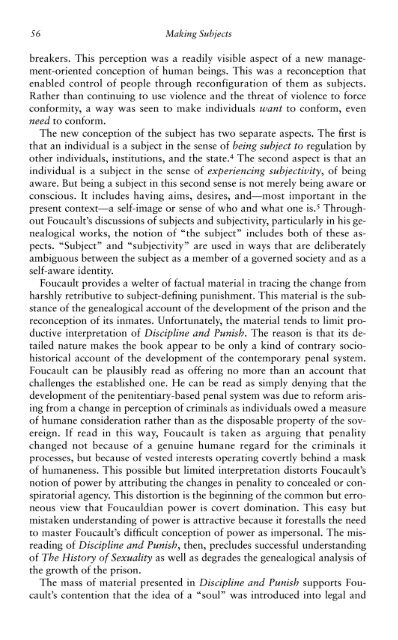Starting with Foucault: An Introduction to Genealogy, Second Edition
Starting with Foucault: An Introduction to Genealogy, Second Edition
Starting with Foucault: An Introduction to Genealogy, Second Edition
You also want an ePaper? Increase the reach of your titles
YUMPU automatically turns print PDFs into web optimized ePapers that Google loves.
56 Making f ubjecabreakers. This perceprion was a readily visible aspect of a new management-orientedconception of human beings* This was a reconception thatenabled control of people thmugh reconfiguration of them as subiects,Rather than continuing <strong>to</strong> use violence and the threat of violence <strong>to</strong> forceconformit5 a way was seen <strong>to</strong> make individuals want <strong>to</strong> conform, evenneed <strong>to</strong> conform.The new conception of the subject has two separate aspects, The first isthat an individual is a subject in the sense of being szlbject <strong>to</strong> regulation byother individuals, institutittns, and the state.& The second aspect is that anindividual is a subject in the sense of mperiencilzg strbj?iectiviv, of beingaware, But being a subject in this second sense is not merely being aware orconscious. It illcludes having aims, desires, and-most important in thepresent context-a self-image or sense of who and what one is,5 ThroughoutFswadt's discussions of subjects and suhjectivitfi; particularly in his genealogicalworks, the notion of ""the subject" hinciudes both of these aspects,""Sbject" and ""subjecsivity" are used in ways that are deliberatelyambiguous between the subject as a member of a governed society and as aself-aware identity<strong>Foucault</strong> provides a welter of factual material in tracing the change fromharshly retributive <strong>to</strong> subject-defining punishment, This material is the substanceof the genealogical account of the develvpment of the prison and thereconception of its inmates, Unfortunately, the material tends <strong>to</strong> limit produetiveinterpretation of Discipline and Pu~ish. The reason is that its detailednature makes the book appear <strong>to</strong> be only a kind of contrary socishis<strong>to</strong>ricalaccount of the development of the contemporary penal system,<strong>Foucault</strong> can be plausibly read as offering no more than an account thatchallenges the established one. He can be read as simply denying that thedevelopment of the penitentiary-based penal syslem was due <strong>to</strong> reform arisingfrom a. change in perception ol criminals as individuals awed a measureof humane consideration rather than as the disposable property of the sovereign.If read in this way, Foucatlk is taken as arguing that penalitychanged not because of a genuine humane regard for the criminals itprocesses, but because of vested interests operating covertly behind a maskof humaneness, This possible but limited interpretation dis<strong>to</strong>rts <strong>Foucault</strong>'snotion of power by attributing the changes in penality <strong>to</strong> concealed or conspira<strong>to</strong>rialagency This dis<strong>to</strong>rtion is the beginning of the common hut erroneousview that Foucauldian power is covert domination. This easy butmistaken undmstanding of power is attraaive because it forestalls the need<strong>to</strong> master <strong>Foucault</strong>'s difficult conception of power as impersonal. The misreadingof Difciplirte and Punish, then, precludes successful understandingof "Phe His<strong>to</strong>ry 4Sexuality as well as degrades the genealogical analysis ofthe growth of the prison,The mass of material presented in Discipline and Pu~ish supports Fowcault"contention that the idea of a ""soul" was introduced in<strong>to</strong> legal and


